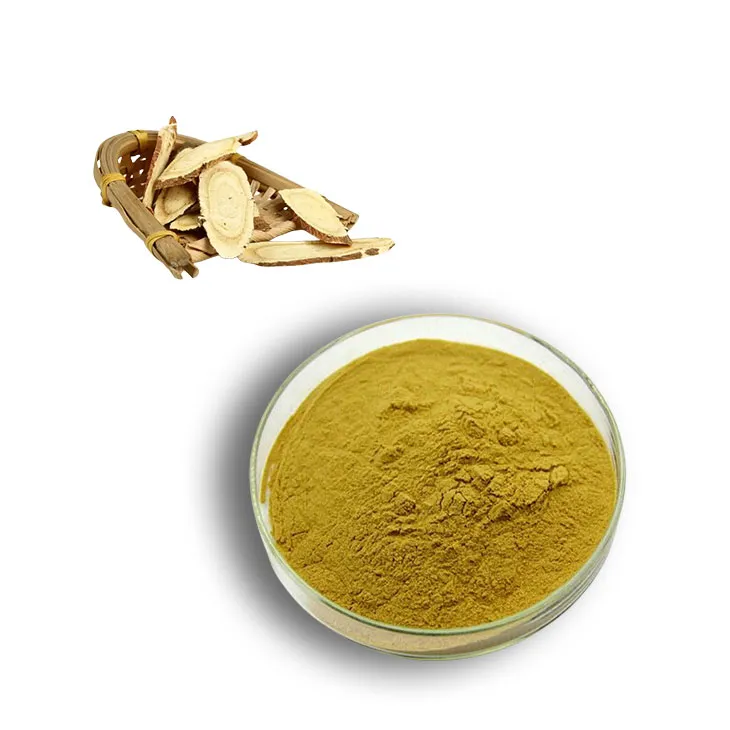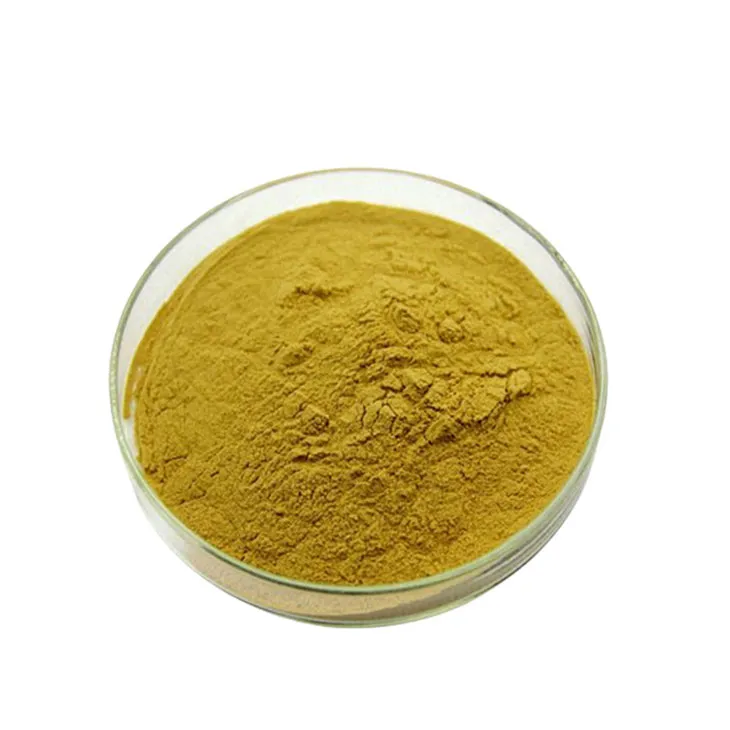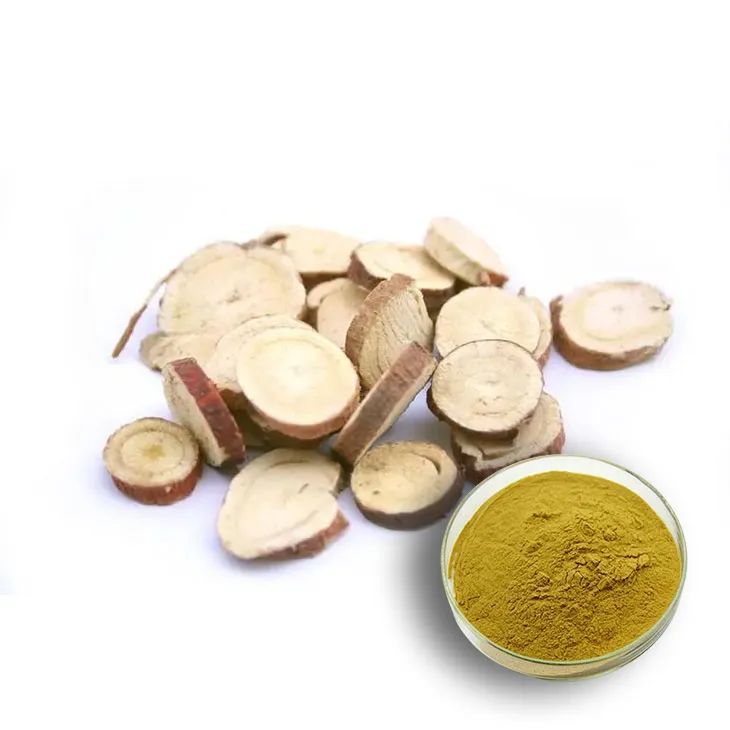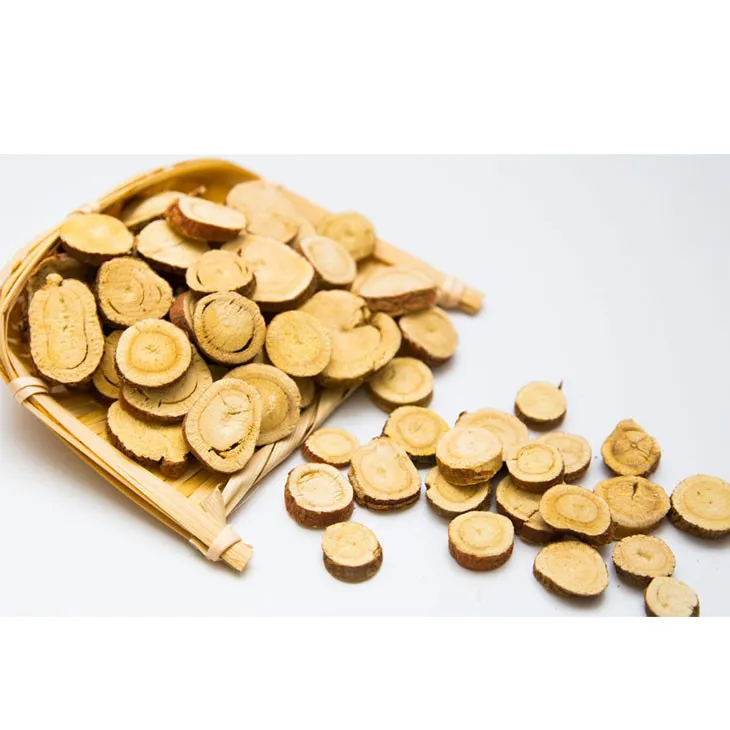- 0086-571-85302990
- sales@greenskybio.com
Licorice root extract powder: components of fertilizers and feeds.
2024-12-02

1. Introduction
Glycyrrhiza root extract powder, which is obtained from the glycyrrhiza plant, has emerged as a highly interesting substance with diverse applications in both the fields of fertilizers and feeds. The glycyrrhiza plant, also known as licorice, has a long history of use in traditional medicine. However, in recent years, its potential in enhancing agricultural and livestock production has been increasingly recognized. This extract powder contains a variety of bioactive components that can have positive impacts on soil quality, plant growth, animal digestion, and overall health. Understanding the properties and functions of glycyrrhiza root extract powder is crucial for harnessing its full potential in sustainable agriculture and livestock farming.

2. Chemical Composition of Glycyrrhiza Root Extract Powder
The glycyrrhiza root extract powder is rich in several important compounds. Glycyrrhizin is one of the most well - known components, which is a triterpene saponin. It has a sweet taste and also exhibits various biological activities. Another significant group of compounds are flavonoids. These flavonoids include liquiritin, isoliquiritin, and others. They contribute to the antioxidant properties of the extract. Additionally, the extract contains polysaccharides which can play a role in soil aggregation and also have potential prebiotic effects in animal feeds. The presence of these diverse compounds makes the glycyrrhiza root extract powder a multi - functional ingredient for both fertilizers and feeds.

3. Role in Fertilizers
3.1 Promoting Microbial Activity
One of the key ways in which glycyrrhiza root extract powder enhances soil health in fertilizers is by promoting microbial activity. The polysaccharides present in the extract can serve as a food source for soil microorganisms. This encourages the growth and proliferation of beneficial bacteria and fungi in the soil. For example, certain bacteria are involved in the nitrogen fixation process. By providing a suitable environment for these bacteria to thrive, the glycyrrhiza root extract powder can indirectly increase the availability of nitrogen in the soil. This is beneficial for plant growth as nitrogen is an essential nutrient for plants.
3.2 Improving Nutrient Availability
The bioactive compounds in the glycyrrhiza root extract powder can also have an impact on nutrient availability in the soil. Glycyrrhizin and flavonoids can interact with soil particles and nutrients. They can chelate certain micronutrients such as iron, zinc, and manganese, preventing them from being locked in unavailable forms. This makes these nutrients more accessible to plants. Moreover, the improvement in soil structure due to the polysaccharides can enhance the movement of water and nutrients within the soil, ensuring that plants can uptake the necessary nutrients more efficiently.

4. Role in Feeds
4.1 Improved Digestion
In animal feeds, glycyrrhiza root extract powder can play a significant role in improving digestion. The flavonoids present in the extract have been shown to stimulate the secretion of digestive enzymes in the animal's digestive tract. For instance, in ruminant animals, it can enhance the activity of cellulase enzymes which are important for breaking down cellulose in plant - based feed. This leads to better utilization of feed components and a reduction in undigested residues. Additionally, the polysaccharides may act as prebiotics, promoting the growth of beneficial gut microbiota. These gut bacteria can further aid in the digestion and absorption of nutrients.
4.2 Growth Promotion
The glycyrrhiza root extract powder also has the potential for growth promotion in animals. The presence of bioactive compounds such as glycyrrhizin can have a positive impact on the animal's physiological functions. It may enhance the animal's immune system, reducing the incidence of diseases which can otherwise impede growth. Moreover, the improved digestion resulting from the use of the extract powder means that animals can obtain more nutrients from their feed, which is directly related to their growth rate. For example, in poultry, it has been observed that the addition of glycyrrhiza root extract powder can lead to increased body weight gain and better feed conversion ratios.

5. Modes of Action
5.1 In Fertilizers
- The bioactive components in glycyrrhiza root extract powder interact with soil components at a molecular level. For example, the chelation of micronutrients by flavonoids and glycyrrhizin is a chemical interaction that changes the availability of these nutrients.
- The polysaccharides in the extract can physically bind soil particles together, improving soil structure. This is important for creating a favorable environment for root growth and nutrient uptake by plants.
- The promotion of microbial activity by the extract powder is a complex biological process. It involves the release of signaling molecules and the provision of a suitable substrate for microorganisms to grow and function.
5.2 In Feeds
- The stimulation of digestive enzyme secretion by flavonoids is thought to occur through receptor - mediated mechanisms. These flavonoids may interact with specific receptors in the cells of the digestive tract, triggering the release of enzymes.
- The prebiotic effect of polysaccharides is related to their ability to selectively promote the growth of beneficial gut bacteria. They can provide a substrate for these bacteria to ferment, producing short - chain fatty acids which are beneficial for the gut health and overall well - being of the animal.
- The growth - promoting effect of glycyrrhiza root extract powder may be due to its modulation of the animal's hormonal and immune systems. It can influence the production of hormones related to growth and development, as well as enhance the animal's resistance to stress and diseases.
6. Potential for Sustainable Agriculture and Livestock Farming
6.1 In Agriculture
The use of glycyrrhiza root extract powder in fertilizers can contribute to sustainable agriculture in several ways. Firstly, by improving soil health and nutrient availability, it can reduce the need for synthetic fertilizers. This can lead to a decrease in the environmental impact associated with the production and use of chemical fertilizers, such as soil and water pollution. Secondly, the promotion of soil microbial activity can enhance the long - term fertility of the soil. A healthy soil microbiome can better cycle nutrients, making the soil more self - sustaining. Thirdly, the use of natural plant - based extracts like glycyrrhiza root extract powder is in line with the principles of organic farming, which is becoming increasingly popular due to consumer demand for more environmentally friendly and healthy food products.
6.2 In Livestock Farming
In livestock farming, glycyrrhiza root extract powder also has great potential for sustainable development. The improvement in animal digestion and growth can lead to more efficient use of feed resources. This means that less feed is wasted, reducing the cost of production for farmers. Additionally, the enhancement of the animal's immune system can reduce the need for antibiotics in livestock production. The overuse of antibiotics in animals has been a major concern due to the development of antibiotic - resistant bacteria. By using natural products like glycyrrhiza root extract powder to promote animal health, the livestock industry can move towards more sustainable and environmentally friendly practices.
7. Conclusion
In conclusion, glycyrrhiza root extract powder is a valuable component in both fertilizers and feeds. Its rich chemical composition, including glycyrrhizin, flavonoids, and polysaccharides, endows it with multiple functions in enhancing soil health, nutrient availability, animal digestion, and growth. The modes of action in both fertilizers and feeds are complex and involve chemical, biological, and physiological processes. The potential for sustainable agriculture and livestock farming is significant, as it can reduce the reliance on synthetic products and contribute to more environmentally friendly and efficient production systems. Further research is still needed to fully explore the potential of glycyrrhiza root extract powder and to optimize its use in different agricultural and livestock production scenarios.
FAQ:
1. What are the main components of glycyrrhiza root extract powder?
The main components of glycyrrhiza root extract powder include glycyrrhizic acid, flavonoids, and some polysaccharides. These components contribute to its various properties in fertilizers and feeds.
2. How does glycyrrhiza root extract powder enhance soil health in fertilizers?
It enhances soil health in fertilizers by promoting microbial activity. The substances in the extract powder can serve as a food source for beneficial soil microbes. These microbes then help in decomposing organic matter and making nutrients more available for plants.
3. What benefits does glycyrrhiza root extract powder bring to animal digestion in feeds?
In feeds, glycyrrhiza root extract powder may help improve animal digestion. The flavonoids and other active components can stimulate the secretion of digestive enzymes in animals, which aids in the breakdown of food and better absorption of nutrients.
4. Can glycyrrhiza root extract powder be used in organic farming?
Yes, it can be used in organic farming. Since it is derived from the glycyrrhiza plant, it is a natural product. In organic fertilizers, it can play a role in improving soil fertility without violating the principles of organic farming. And in organic feeds, it can offer natural ways to promote animal growth and health.
5. How is glycyrrhiza root extract powder processed for use in fertilizers and feeds?
The glycyrrhiza roots are first harvested. Then, through extraction methods such as solvent extraction, the active components are obtained. After purification and drying processes, the extract powder is obtained and can be formulated into fertilizers or feeds according to specific requirements.
Related literature
- The Role of Glycyrrhiza Root Extract in Sustainable Agriculture"
- "Glycyrrhiza Root Extract: A Natural Booster for Animal Feeds"
- "Chemical Composition and Functional Properties of Glycyrrhiza Root Extract Powder for Agricultural Applications"
- ▶ Hesperidin
- ▶ Citrus Bioflavonoids
- ▶ Plant Extract
- ▶ lycopene
- ▶ Diosmin
- ▶ Grape seed extract
- ▶ Sea buckthorn Juice Powder
- ▶ Fruit Juice Powder
- ▶ Hops Extract
- ▶ Artichoke Extract
- ▶ Mushroom extract
- ▶ Astaxanthin
- ▶ Green Tea Extract
- ▶ Curcumin
- ▶ Horse Chestnut Extract
- ▶ Other Product
- ▶ Boswellia Serrata Extract
- ▶ Resveratrol
- ▶ Marigold Extract
- ▶ Grape Leaf Extract
- ▶ New Product
- ▶ Aminolevulinic acid
- ▶ Cranberry Extract
- ▶ Red Yeast Rice
- ▶ Red Wine Extract
-
Angelica sinensis extract
2024-12-02
-
Curcuma Longa Extract
2024-12-02
-
Epimedium extract powder
2024-12-02
-
Aminolevulinic acid
2024-12-02
-
Mangosteen extract powder
2024-12-02
-
Bilberry Extract
2024-12-02
-
Phyllanthus Emblica Extract
2024-12-02
-
Coix Seed Extract
2024-12-02
-
Saffron Extract Powder
2024-12-02
-
Troxerutin
2024-12-02





















